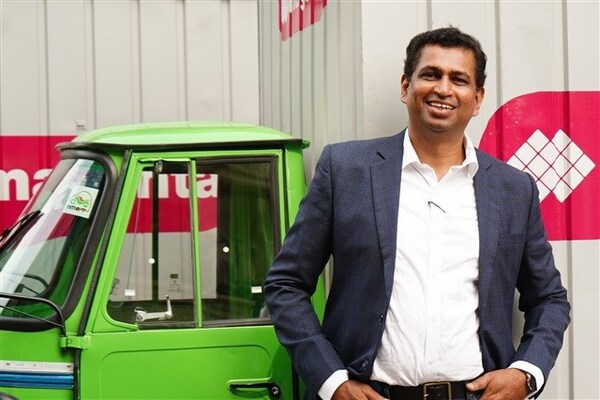2024-11-26 DIGITIMES ASIAHaiPress
TAIPEI,Nov. 26,2024 -- According to the news report from the technology-focused mediaDIGITIMES Asia,India's electric vehicle (EV) market is seeing contrasting trends,with passenger EV sales declining while the commercial segment grows rapidly. Recent data shows a 9 percent year-on-year drop in passenger EV sales in September 2024,marking the lowest point in 19 months.

Maxson Lewis,founder and MD,Magenta Mobility. Credit: Magenta.
In contrast,electric three-wheeler cargo vehicles are gaining traction,with 45% of sales in the segment being electric last month and forecasts to exceed 50% soon,according to Maxson Lewis,founder and MD of Magenta Mobility.
"The real adoption of EVs is happening on the cargo side," Lewis said,emphasizing the segment's potential to drive India's electrification. This shift underscores how logistics-focused EVs are leading the country's sustainable mobility efforts despite challenges in the passenger market.
He attributed this trend to a combination of favorable government policies,improved battery technology,and the declining total cost of ownership (TCO) for electric cargo vehicles.
Addressing charging infrastructure challenges
A robust charging infrastructure has been a critical factor in the adoption of EVs,but challenges remain. According to Lewis,India's highway network is already well-equipped with charging stations,averaging one every 100 kilometers. However,the focus has shifted from availability to reliability.
"The issue is not the presence of chargers but whether they are functional - downtime is a concern," Lewis explained. He emphasized the need for better charger maintenance and management,predicting the emergence of third-party service providers specializing in charger upkeep.
For Magenta Mobility,charging infrastructure is less of a challenge due to its strategy of setting up charging hubs near client locations. "We build our charging hubs months in advance,ensuring seamless operations for our fleet,adding that this approach minimizes reliance on public networks.
Magenta's market share
Magenta Mobility has cemented its position as India's largest electric cargo fleet operator,with over 2,500 electric vehicles across 18 cities.
The company serves a diverse range of clients,including e-commerce firms and traditional industries such as automotive components,lubricants,and consumer goods.
"We transport everything from lubricant oil and mattresses to food items and television sets,highlighting the versatility of the fleet.
The company's customer satisfaction score of 96.6% reflects its strong commitment to quality and service,Lewis added. Magenta has also been expanding its fleet to include four-wheelers,broadening its capabilities to handle mid-mile logistics in addition to last-mile deliveries.
"This shift opens new opportunities for clients and diversifies our revenue streams," Lewis explained.
Challenges and opportunities
Despite its success,the commercial EV sector faces hurdles. One of the primary challenges is the availability of high-quality vehicles. While three-wheeler options have improved significantly,the market still lacks adequate four-wheeler models for commercial use.
Another challenge is financing. "Access to financing has improved,but the cost of capital for EVs remains higher than for conventional vehicles," Lewis noted.
Driver availability is another issue. Magenta addresses this by offering timely salaries,welfare schemes,and insurance to attract and retain skilled drivers. "Quality,safety,and integrity are non-negotiables for us," Lewis emphasized.
The role of government policies
Government subsidies have played a significant role in supporting EV adoption in India.
Lewis expressed confidence in the government's continued commitment to the EV ecosystem,citing its focus on the commercial segment through the Faster Adoption and Manufacturing of Hybrid and Electric Vehicles (FAME) scheme.
"The government has learned from global leaders like China and understands the need to invest in EVs for long-term sustainability," Lewis said. He also advocated for directing subsidies toward vehicles rather than charging infrastructure,arguing that this approach would maximize efficiency.
Looking ahead
Magenta Mobility has ambitious plans for growth,including expanding its operations to additional Indian cities and exploring international markets. While the logistics business will remain India-focused,the company's tech platform,which includes state-of-charge monitoring and battery health analytics,is designed for global scalability.
"Southeast Asia is lagging in EV adoption but has shown strong interest in our technology," Lewis said. He identified the Middle East and Southeast Asia as key regions for future expansion.
As the largest commercial EV operator in India,Magenta Mobility's primary competition now comes from traditional logistics providers rather than other EV players. "Our ambition is to become the largest logistics provider,not just the largest EV operator," Lewis remarked.
While the likes of hydrogen-based transportation may eventually challenge EVs,Lewis believes it is still a decade away from significant adoption. In the meantime,Magenta Mobility remains focused on its core mission: driving the adoption of sustainable and efficient logistics solutions.
02-24
02-24
02-23
02-22
02-19
02-19
02-16
02-13
02-13
02-12